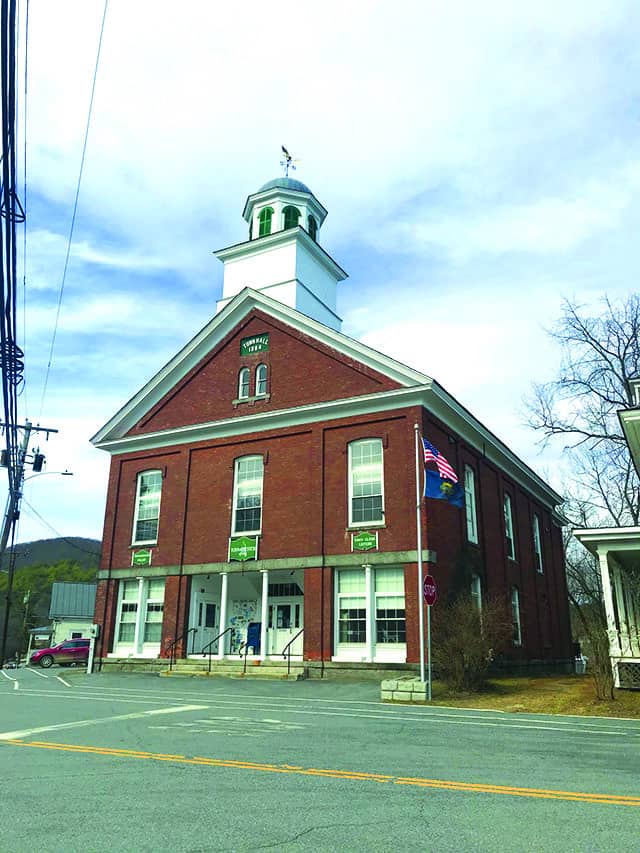
CHESTER, Vt. – The Chester Selectboard focused the majority of their Feb. 16 meeting on the upcoming opt-in Cannabis retail vote, which will take place at the upcoming Chester Town Meeting, with board members arguing both sides of the issue.
The board began the retail cannabis opt-in vote discussion by reviewing three questions they had set to answer at their last meeting: required distance from school property, law enforcement tools for detection of cannabis impaired driving, and oversight of pesticides in cannabis cultivation.
Distance from schools, which was identified as a 500-foot distance from school property either abutting school property or within 500 feet of a stream or a public highway, still left a few clarifying questions the board still wanted to find answers to.
Additional police training is available in the form of two options: either through an Advanced Roadside Impaired Driving Enforcement training, which has been required since 1986, or becoming a Drug Recognition Expert, which requires extensive additional man hours.
On the subject of pesticides, the board confirmed that they were regulated by the Vermont Department of Agriculture. Board member Lee Gustafson brought up his concerns about lack of control by the board and potential contamination of ground water. The discussion was brought to an end however when board member Heather Chase reminded the board that any issues related to growing had nothing to do with opt-in vote for retail sales that the town is considering.
Gustafson, who has openly opposed retail cannabis in Chester, then turned his attention to a 30-page document received by the State of Vermont Cannabis Control Board outlining in detail the regulations of cannabis establishments, a document received over a month ago and distributed in their informational packet for this meeting. He said that the document raised more questions for him, and said that they were getting way ahead of themselves on this whole issue.
Chase said that at this point that it’s up to the voters, although she felt they could wait and “let other people make mistakes and see what their mistakes are.”
Board Chair Arne Jonynas countered saying that by the same token, you can have other people reap the benefits by being the first to do something too. “There’s two sides to everything,” he stated. He added that when looking through documentation, for every point he’s read, he could go online and find something that refutes it.
Jonynas also questioned a previous document Gustafson had provided the board, a 13-page document entitled “Why Marijuana Retail Sales are Not Good for Chester,” that was distributed to the board in January, saying that Gustafson had quoted the CDC in the document, but a month ago on another matter said that Gustafson didn’t believe anything the CDC said, so it “kind of threw into question the whole document.”
Gustafson responded that he appreciated the feedback, and said he also used other references to make the same point. He then posited that the board put out a statement or resolution saying they didn’t believe they needed more time and that the board thinks voters should have more information. He went on to add that he’d be happy to come up with language for that statement if that was how the board wanted to proceed.
Chase again reiterated that it was up to the voters about whether cannabis should be sold in Chester, and that the state had already decided that cannabis was legal and decriminalized, and she was supportive of those decisions, although would have liked to see more definitive pros and cons spelled out.
Jonynas said that he felt that Chester would be fine with retail cannabis and could handle it and that he did not feel they had the right to restrict local business. “I don’t think it’s the government’s job is to put restrictions on businesses. Once it’s legal in the state, I have a hard time, as a local representative of the local government saying, ‘No, you can’t do that,’” said Jonynas. He added that he didn’t think voting retail cannabis down would change usage of cannabis at all.
Board member Jeff Holden stressed the need for the community to still work together on other issues, even if some are split on the cannabis vote. “We need to work together on everything… This is just one subject. Let’s not let it spoil everything,” she said.
Chester resident Scott Blair, who is behind the petition in support of the opt-in vote, said that the Vermont Cannabis Control Board meets every Monday at 11 a.m., and can be viewed remotely.
In other town business, Town Manager Julie Hance provided a list, along with costs, to the board on projects that have been identified by Chester Department heads and other community members for ways to use the town’s ARPA funds. Those projects will continue to be discussed in future meetings and they will continue to get community feedback.
Hance asked permission to apply for a $200,000 grant from the Downtown Transportation fund, with applications due in early March. The grant would provide funding for the Wayfinding Plan, which includes erecting signage leading people to the Village and other areas around town.
Two benches, donated by new Chester resident Mr. Sottovia, will be placed in front of the Academy Building lawn area so folks can sit and observe the Chester green. Installation will begin in the spring.
The next regular Chester Selectboard meeting is scheduled for Wednesday, March 2 at 6 p.m. at the Chester Town Office or via Zoom. The town informational meeting is scheduled for Monday, Feb. 28, with the Town Meeting vote, by Australian ballot, on Tuesday, March 1.